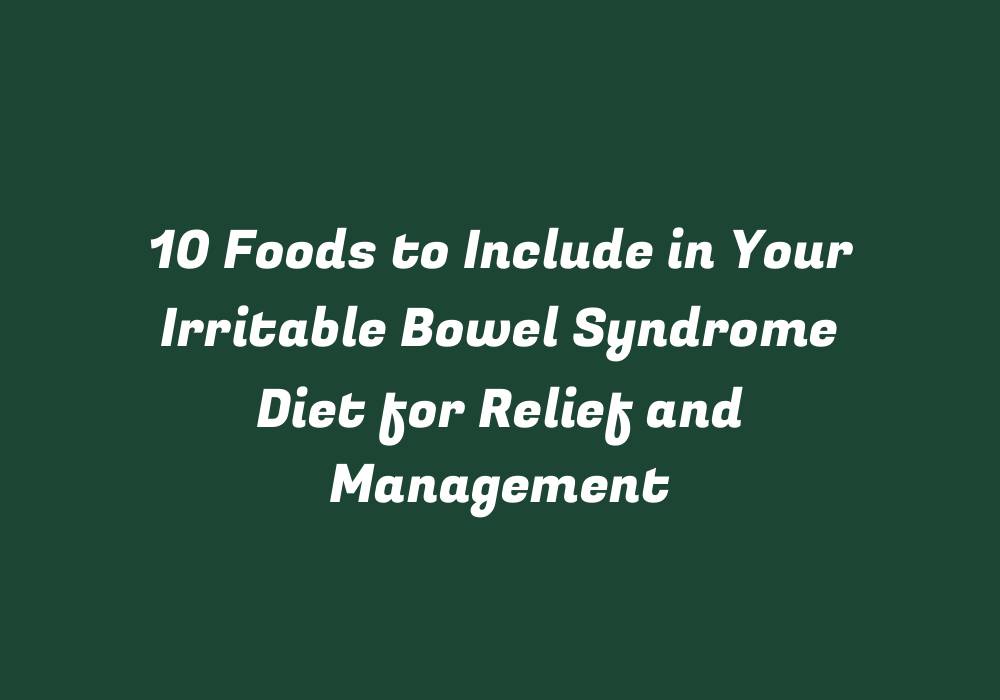Introduction to Irritable Bowel Syndrome (IBS) and the Importance of Dietary Changes
Irritable Bowel Syndrome, commonly known as IBS, is a disorder that affects the large intestine. While there isn’t a specific cause for this condition, it can result in frequent abdominal pain, discomfort, bloating and changes in bowel habits like diarrhea or constipation. Managing IBS includes addressing its triggers, which may include stress, certain medications and the food we eat.
Incorporating specific foods into your diet can help alleviate the symptoms of IBS and improve overall health. Below are ten essential foods that can be included in your IBS diet for relief and management.
1. High-Fiber Foods
Although high fiber content can cause discomfort for some people with IBS, incorporating the right types of fiber into your diet can help regulate bowel movements. Soluble fibers like those found in oat bran and fruits form a gel-like substance that soothes the digestive tract and slows down the movement through it. Insoluble fibers, on the other hand, promote regularity. Choose a variety of fiber sources such as whole grains, beans, vegetables, and fruit to find your individual balance.
2. Low-FODMAP Foods
Low FODMAP diets are specifically designed for those suffering from IBS, reducing the intake of fermentable oligosaccharides, disaccharides, monosaccharides, and polyols (short-chain carbohydrates). Eliminating or limiting these carbohydrates helps alleviate symptoms related to diarrhea, constipation, bloating, and pain. Some examples of FODMAP-friendly foods include rice, lean meats, potatoes, yogurt, and some vegetables.
3. Lean Proteins
Protein is essential for maintaining a healthy body, and lean proteins are easy to digest. Choose fish, poultry, and eggs as your main sources of protein. Opt for low-fat options whenever possible to prevent exacerbating IBS symptoms caused by fats and fatty foods. Protein also helps maintain gut health by supporting the production of beneficial bacteria in the digestive tract.
4. Probiotic Foods
Probiotics are “good” bacteria that help regulate the balance of bacteria in your gut, which can reduce bloating and improve bowel function. Consume fermented foods like yogurt, kefir, kimchi, miso, sauerkraut, and tempeh as they contain live cultures or probiotics. A healthy gut promotes overall digestion and immune system function.
5. Prebiotic Foods
Prebiotics are fiber-rich foods that serve as a food source for the beneficial bacteria in your gut, supporting their growth. Include foods such as onions, garlic, artichokes, leeks, and chicory root in your diet. A diet high in prebiotic foods can promote a healthy balance of gut microbes and improve digestion.
6. Complex Carbohydrates
Choose complex carbohydrates like sweet potatoes, whole grain bread, pasta, quinoa, or brown rice for sustained energy release and more stable blood sugar levels. These foods provide the body with vitamins, minerals, and fiber, which can aid in IBS symptoms. Avoid simple sugars that may exacerbate abdominal pain.
7. Healthy Fats
Choose unsaturated fats such as olive oil, nuts, seeds, and fish for their numerous health benefits. These healthy fats can help reduce inflammation, improve gut barrier function, and even boost your mood. Be cautious with saturated fat sources like red meat or high-fat dairy products, which may contribute to IBS symptoms in some individuals.
8. Hydrating Foods
Staying hydrated is crucial for overall health and digestion. Incorporate water-rich fruits and vegetables like watermelon, strawberries, cucumbers, and celery into your daily diet to ensure you’re consuming enough fluids. These high water content foods can help alleviate constipation and maintain regular bowel movements.
9. Ginger
Ginger is a versatile spice with anti-inflammatory properties that may ease digestive issues. Add ginger to your meals or tea for relief from IBS symptoms such as nausea, abdominal pain, and bloating.
10. Herbal Teas
Herbal teas can be soothing for the gut and provide relaxation during stressful times. Try peppermint or chamomile tea to help alleviate abdominal discomfort, bloating, and gas associated with IBS symptoms.
In conclusion, managing IBS includes finding a balance between specific dietary choices, reducing triggers, and seeking medical advice when necessary. By incorporating the foods mentioned in this article into your daily routine, you can significantly improve your quality of life while living with Irritable Bowel Syndrome.
